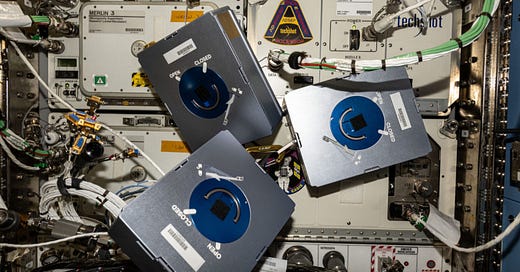Finding Cutting-Edge Cancer Treatment in Space
Redwire Awarded Contract from Aspera Biomedicines for the Research
Aspera Biomedicines has awarded a contract to Redwire to conduct space-based research and analysis on a new cancer treatment. The research will utilize Redwire’s Pharmaceutical In-space Laboratory (PIL-BOX) technology.
Redwire’s PIL-BOX technology continues to be a critical resource for enabling game-changing discoveries to advance human health.”
John Vellinger, Redwire
Aspera, a pharmaceutical company specializing in the development of cancer stem cell targeted therapies, will use this mission to advance development of rebecsinib, a small molecule ADAR1 inhibitor recently approved by the U.S. Food and Drug Administration to begin first-in-human trials. On Earth, scientists have noted an upregulation – or increased rate of expression – of the ADAR1 protein in cancer stem cells as being linked to the accelerated progression of some types of cancer. Researchers at Aspera have analyzed data from two previous spaceflight experiments that showed that rebecsinib can inhibit expression of ADAR1, halting the progression of cancer stem cell propagation in triple-negative breast cancer organoid models. Results from Aspera’s prior experiments indicate that rebecsinib could behave as a cancer “kill switch.”
On this mission, Aspera researchers will analyze the crystal structure of ADAR1p150 with and without rebecsinib or intermediates. The results of this analysis could enhance opportunities to develop new drug formulations and a broader array of ADAR1 inhibitors.
“Redwire is excited to facilitate critical space research for Aspera Biomedicines’ cutting-edge cancer treatment that could have major implications in the global fight against cancer,” said Redwire’s president of In-Space Industries John Vellinger. “Redwire’s PIL-BOX technology continues to be a critical resource for enabling game-changing discoveries to advance human health.”
“At Aspera, it is a privilege to partner with our industrious and innovative colleagues at NASA, CASIS, and Redwire, through a NASA In Space Phase 2 biomanufacturing grant, to utilize microgravity to enhance and accelerate protein crystallization of the target of our FDA IND-approved small molecule inhibitor of the cancer cloning and immune evasion gene, ADAR1p150,” said Aspera’s co-founder, Catriona Jamieson. “We anticipate that this unique partnership combined with the science accelerating environment of the NASA International Space Station will extend the spectrum of small molecule ‘cancer kill switches’ aimed at preventing cancer stem cell cloning and immune evasion properties that drive relapse, the leading cause of cancer-related mortality.”
With 28 units flown and processed to date, PIL-BOX is the premier platform for pharmaceutical researchers, leveraging the microgravity environment to grow small-batch crystals of protein-based pharmaceuticals and other key pharmaceutically relevant molecules.
Previous PIL-BOX investigations conducted with partners including Bristol Myers Squibb, ExesaLibero Pharma, Eli Lilly and Company, and Butler University have focused on unlocking insights to improve treatments for cardiovascular disease, obesity, and diabetes.
The Aspera cancer treatment investigation is slated to launch later this year.





